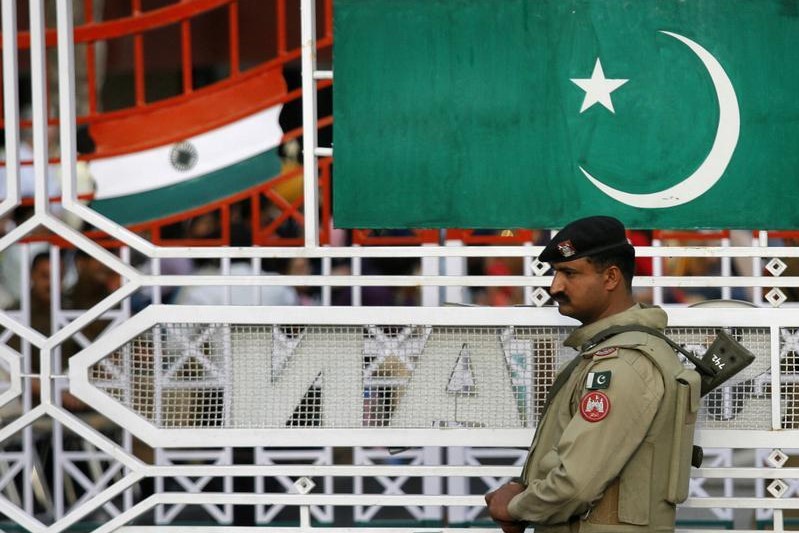Reuters photo
By
Zeeshan A. Shah
For the past eight years India has been the world’s largest arms importer, buying over $100 billion in weapons each year, two-thirds of which are deployed against Pakistan.
Moreover, India has now occupied critical strategic space across western Pakistan that borders Afghanistan and Iran. Attacks launched through inside proxy terrorist regimes including IS, TTP, BRA, Jamaat-ul-Ahrar and BLA. The Indian connection via Iran’s Chabahar Zahedan inter-pass axis is now being used to attack Baluchistan that covers the Mekran Coast and Gwadar – impacting CPEC and Karachi, thereby launching inside wars.
Elsewhere, CIA, Mossad and RAW’s hostile agency collaboration should be of mutual concern for Pakistan and Iran, where both countries can work closely to manage bilateral agendas successfully. IMAT – Islamic Military Alliance against Terrorism has not gone well with Iran after Saudi Arabia connected with Pakistan senior armed forces leadership to bring expertise and strategic depth into its operating capability. This has triggered a new negative for Pakistan bringing India close to Iran. IMAT is generally presumed to work effectively as an anti-Iran bloc with 41 nation armies joining alliances with the undefined aim to fight terrorism by Saudi standards- something that is a high risk theory for any Muslim country especially after the recent arms deal signed between USA and KSA.
The geographic standpoint for Pakistan poses a fragile scenario with the country s sizable population of two distinct blocs – Sunni and Shiite. Our foreign policy agenda would have been beefed up on solid grounds to ensure we remain politically correct as far as the regional footprint is concerned and that we connect right with Russia and Turkey while building trust with Iran.
India continues to exploit the tensions between Iran and Pakistan to their own competitive advantage. In 2003, Iran signed the Defense Pact with India allowing the latter to use its military bases and ports against Pakistan in the event of an Indo-Pak escalation. This could lead to complications for Pakistan, whereby Iran can give access to many strategic entry points for India to infiltrate with its nuclear assets stockpile leading to a two –front war across our borderline. It is vital to take matters urgently and move decisively to counter India on both fronts – via Iran and Afghanistan thereby denying India any further strategic space across our western border. Here, we also have to wake up to the rising underhand war on water resources and focus on the Indus Water Treaty negotiations through arbitration and swift justice through the ICC and the World Bank.
In this unstable, sensitive and uncertain environment, critical decisions must be taken by the Pak-Iran diplomatic teams without outside Saudi or Indian influence. Both IMAT in 2017 and the earlier India-Iran defense pact are more mutually destructive than constructive. Though IMAT may not be effective in the real sense for the Muslim countries, the Defense Pact of 2003 is a far more serious threat to the region, where Israel is also actively pursuing terrorism and sabotage through terrorist financing and proxy wars.
Pakistan needs to get clarity with Iran as significant partners, not to allow India to use either country’s land mass to launch any attack on either country’s soil and that Iran revisits the terms and agreements of the Defense Pact with India to ensure safety and stability. The Islamic world is divided today and Pakistan needs to be the premier building bloc and the nation that unites instead of divides. On the inside, Pakistan needs to get up the curve on military strategy and good governance by the elected representatives, minus political bickering and politics for nuisance value.
China, the other frontier nation is the key to this war doctrine. It has already invested over USD 100 billion in Iran and Pakistan and is clearly not going to allow any external force to intervene and threaten its investment. This would mean definite cooperation between Gwadar and Chabahar on capacity building and capability.
War is a matter of vital importance to the State: the province of life or death: the road to survival or ruin. Therefore, it is mandatory that we study it carefully and know the implications of war in the current world while preventing casualties of war in the future world if we are to succeed as a country. Pakistan must secure its western front to counter the inside wars – faster and with more strategic focus on key developments within its neighbor states to prevent any negative scenario in the near future. In essence, the Pak-Iran relationship must reach greater depths of success and warmth in the eventual future leading to the only path to progress peace and harmony.
We must end the inside wars and politics of deception and act as a responsible government moving beyond petty local issues and rise as a powerful leader nation promoting unity within the Muslim world beyond 2017.
Zeeshan A. Shah
The writer is a Director at CNNA Pakistan – a leading advocacy institute and is an expert on International Relations and Education Policy.
With over 150 publications in major local and global social media & newspapers, he has been instrumental in producing over 5000 radio broadcasts aired globally.
A thought leader, environmental journalist, media broadcaster and a change maker with an acute focus on development affairs & education for Pakistan.



No Comments Yet!
You can be first to comment this post!